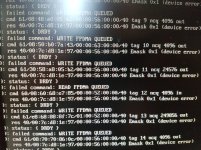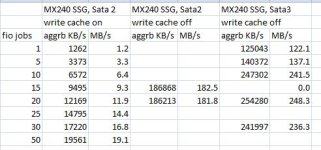I've been running Proxmox v2.3 since Feb 2013 on an i7-2600K, Asus Sabertooth P67 mobo, 2x4GB F3-12800CL9-4GBXL RAM. Proxmox is installed on a 100GB partition on a 1TB Samsung Spinpoint F1 HDD and the rest is partitioned for pve-data.
I run a couple Ubuntu Server VMs and a couple Win7 VMs. One of the Ubuntu Servers is hosting a web page via Apache2 and twice now (months apart) I've noticed the website losses access to data on it's virtual hdd (virtio0, raw). Apache still responds but it serves up old data. After rebooting the VM, it finds disk errrors and repairs them. Then it seems as though everything works again until next time. This last time I connected a keyboard/mouse/lcd to the proxmox host and saw the errors shown in the attached screenshot. I'm thinking my main HDD is at fault? I think it's only affected the one VM so far, unless the others somehow deal with it gracefully.
So if I'm replacing my main HDD, should I try a SSD and install ver 5 at the same time? Should my VMs be compatible with the newer version? Is it a bad idea to try upgrading from v2.3 to v5.x?
Thanks!
I run a couple Ubuntu Server VMs and a couple Win7 VMs. One of the Ubuntu Servers is hosting a web page via Apache2 and twice now (months apart) I've noticed the website losses access to data on it's virtual hdd (virtio0, raw). Apache still responds but it serves up old data. After rebooting the VM, it finds disk errrors and repairs them. Then it seems as though everything works again until next time. This last time I connected a keyboard/mouse/lcd to the proxmox host and saw the errors shown in the attached screenshot. I'm thinking my main HDD is at fault? I think it's only affected the one VM so far, unless the others somehow deal with it gracefully.
So if I'm replacing my main HDD, should I try a SSD and install ver 5 at the same time? Should my VMs be compatible with the newer version? Is it a bad idea to try upgrading from v2.3 to v5.x?
Thanks!




